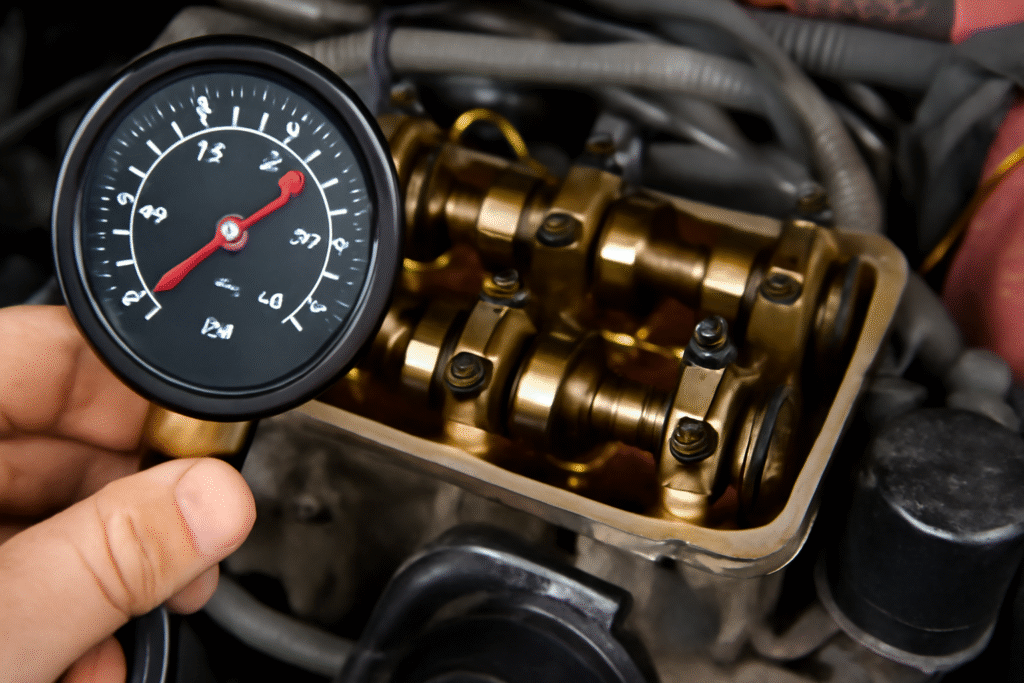If your car’s oil pressure is low at idle, there are a few things you can do to increase it. One is to add a higher viscosity oil, which will increase the pressure. Another is to change the oil pump, which will also increase the pressure.
You can also try increasing the engine speed, which will create more pressure. Finally, if all else fails, you can replace the pressure sensor.
- Check the oil level and add oil if necessary
- Start the engine and let it idle for a few minutes to warm up
- Rev the engine slightly and observe the oil pressure gauge
- If the needle does not move or moves very slowly, there may be a problem with the oil pump or pressure relief valve
- Contact a mechanic for further diagnosis
Why is My Oil Pressure So Low at Idle?
There are many reasons why your oil pressure may be low at idle. It could be due to a problem with your oil pump, a clogged oil filter, or an issue with your engine bearings. If you’re not sure what’s causing the problem, it’s best to take your car to a mechanic for diagnosis.
Will Thicker Oil Raise Oil Pressure?
As long as the oil is at the correct level, thicker oil will not raise oil pressure. Using a thicker oil may lower your pressure because it takes more effort for the oil to pump through the system.
What Can I Use to Increase Oil Pressure?
If your engine has low oil pressure, there are a few things you can do to try and increase it. First, check the oil level and make sure it is full. If it is low, add more oil until it reaches the proper level.
Next, check the oil pressure sensor to see if it is working properly. If not, replace it. Finally, check the oil pump to see if it is clogged or damaged.
If so, clean or replace it as needed.
Will Synthetic Oil Raise Oil Pressure?
If your engine is running low on oil, it might be time to switch to a synthetic oil. But will this new oil raise your oil pressure? Let’s find out.
Most engines will have an ideal oil pressure range between 20 and 60 psi. If your car’s engine is running below this range, it could be due to a variety of factors such as a clogged filter, low oil level, or worn-out engine parts. One way to potentially increase your car’s oil pressure is by switching to synthetic motor oil.
Synthetic oils are designed to flow better at lower temperatures than conventional oils, which means they can help maintain proper oil pressure in cold weather conditions. Additionally, synthetic oils tend to have higher viscosity ratings than conventional oils, meaning they can provide better protection for your engine at high temperatures. So if you’re looking for an oil that can potentially help raise your car’s oil pressure, synthetic motor oils may be worth considering.
Oil Pressure Booster Additive
Oil pressure booster additives are designed to increase the oil pressure in an engine. The most common type of additive is a friction modifier, which reduces the friction between moving parts in an engine. This can lead to increased oil pressure, and can also improve fuel economy and reduce wear on engine components.
Some oil pressure booster additives also contain detergents and dispersants that help keep the engine clean and free of deposits.
Oil Pressure Drops to Zero at Idle
If you have an oil pressure gauge on your vehicle, you may notice that the needle drops to zero while the engine is idling. This is normal and nothing to be concerned about. The reason for this is that when the engine is idling, there is less demand for oil.
The oil pump isn’t working as hard and doesn’t need to circulate as much oil. As a result, the pressure in the system drops. Once you start driving again and the engine speed increases, the oil pressure will go back up.
So if you see your oil pressure gauge drop to zero at idle, don’t worry – it’s normal!

Will 10W40 Increase Oil Pressure
If you’re wondering if 10W40 oil will help increase your oil pressure, the answer is maybe. This heavier oil can provide better protection for your engine at high temperatures and also help to reduce leaks, but it may not be necessary for everyone. Check with your mechanic to see if this type of oil is right for your car.
Best Oil for Low Oil Pressure
If your car is low on oil pressure, it’s important to choose the right oil to replenish it. Not all oils are created equal, and some may actually do more harm than good. In this article, we’ll guide you through the best oils for low oil pressure, so you can get your car back up and running in no time.
How To Increase Oil Pressure
Conclusion
If your car idles too low, it could be because the oil pressure is not high enough. To increase oil pressure at idle, start by checking the oil level and adding more if it is low. If that doesn’t work, try changing the oil to a thicker weight.
You can also try using an additive to increase viscosity or using a higher-pressure relief valve spring. If all else fails, you may need to replace the oil pump.




Leave a Reply